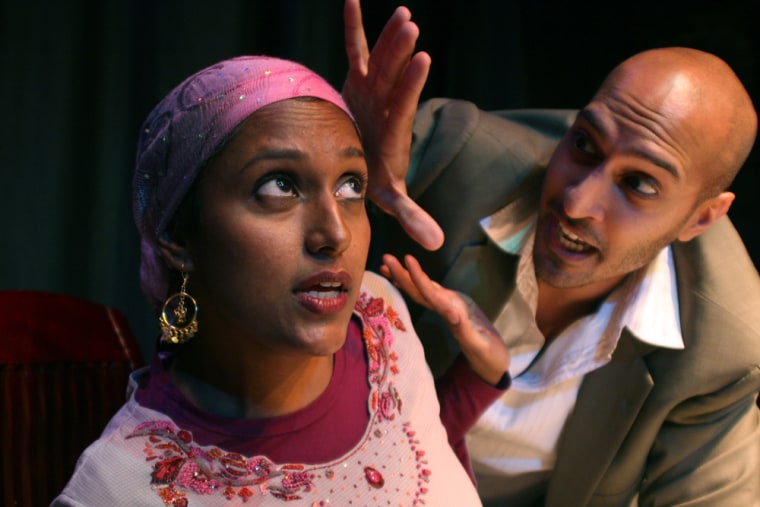NEW YORK — One of the first plays about Muslim life in the United States debuts in a time and place fraught with symbolism: Sept. 11 in New York City.
Called “The Domestic Crusaders,” the play follows six family members as they come together to celebrate the 21st birthday of the youngest son. Generational divides, family strife and sibling rivalries soon emerge.
The author, 29-year-old Wajahat Ali, says his 2-act play is an attempt to create a space for discussion about the Muslim experience in a post-9/11 world. He’s not worried that some people consider the location and date of the premiere provocative.
“9/11 is the ideal date, especially in New York,” he says, because the city “bears the brunt of that tragedy.” The day is a “historical reminder of the tragic consequences of madness, ignorance and violence.”
With what Ali calls the “scapegoating of Muslim-Americans” in the background, the play’s characters dive into uncomfortable issues, ranging from cultural clashes to racial profiling to the role of women in Islam to the war on terror, while enjoying chai and biryani in their comfortable couches in the living room.
As Salman and Khulsoom, an immigrant couple from Pakistan, fight hard to keep their traditions and earn a comfortable life in America, they get frustrated with the changes their children go through:
Head scarf-clad daughter Fatima studies law and dates an African-American Muslim; eldest son Salahuddin obsesses over success and materialism; and the college student Ghafur sets out to become an academic to dispel misinformation about Islam, defying his parents’ expectation to become a doctor.
Birth of 'Crusaders'
When the World Trade Center towers fell, Ali was the head of the Muslim Student Association at the University of California, Berkeley. As the son of a Pakistani immigrant family who “never hid my Muslim identity,” Ali says the tragedy came to define his college years.
He devoted 70-80 percent of his time to activism — organizing Jumaa prayers outdoors on campus, distributing flyers, inviting students to discussion panels — in a relentless effort to fight what he considered misinformation about Islam.
It was in a short story class with Pulitzer-nominated poet Ishmael Reed that he first started working on “Crusaders.”
Reed was tired of seeing Muslims caricatured in the media, and he encouraged Ali to depict them in a realistic and non-sanitized fashion, like Arthur Miller’s “Death of a Salesman” or Eugene O'Neill’s “A Long Day’s Journey into the Night.”
Despite serving as a mentor to the play's author, Reed doubts American theater is ready for “The Domestic Crusaders.”
“It’s about an American family that is Muslim, that’s why it’s controversial,” he says, adding that unless it sells well, production companies will not touch this “off off-Broadway show.”
Rejections
For years, Ali thought he might never get to stage the play at all. With many theater companies and producers turning him down, he had to be content with occasional readings — funded by his parents — in restaurants around Berkeley.
“I think it was because the hysteria, the fear, that kind of represented the voice of the Bush administration were still lingering,” Ali says. “Even Dixie Chicks, the whitest women in America, who loved Jesus and the Apocalypse, were branded as traitors…. here I am, with a multi-syllabic Arabic name. I am sure people freaked out.”
When a Hollywood producer told Ali that he would only stage the play if he “changed” it or included Ted Danson in the cast, he laughed. “’Change’ was a code word for making the characters less Muslimy and brown,” he wrote in his Huffington Post blog.
Now, with his play premiering on a small stage in New York City, Ali is hopeful it will help jumpstart a dialogue.
“Right now, it’s 2009. It’s kind of a different atmosphere,” Ali says.
‘National security’
Dalia Mogahed, executive director of Gallup Muslim Studies and a member of Obama’s Advisory Council on Faith-Based and Neighborhood Partnerships, says “The Domestic Crusaders” allows the audience to see a more humanized face of Muslims.
“The only time they [Muslims] make news is around the issues of either Middle East violence or … within the prism of national security,” she says.
Such views of Muslims have not allowed the recognition of Muslim-American contributions to “the art and culture fabric of America,” she says, and Ali’s play is crucial in its attempt to “immortalize that moment in our history where things were very hard for people.”
Mogahed points to a 2009 Gallup poll – “Muslim Americans: A National Portrait” – for evidence of this hardship.
According to the poll, American Muslims are more likely to be angry and express worry than non-Muslims, and young Muslims between the ages of 18-29 are less likely than their peers in other religious communities to be classified as thriving.
Optimism
Ali remains optimistic his play will find a receptive audience.
“Domestic Crusaders is a vehicle to help bridge the divide through art,” he says, and humor will make “the medicine go down easier.”
Reed, his mentor, says it has already made a difference in the Muslim-American community, and that one day it have a wider influence.
“This is how Renaissance begins,” he says. “It will change American theater eventually.”
